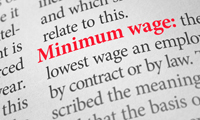

Today (1 April 2016), the new National Living Wage (NLW) will come into force. The Federation of Small Businesses (FSB) is calling on small firms to make sure they act on this new legal requirement to avoid heavy penalties.
The NLW, not to be confused with the voluntary Living Wage set by the Living Wage Foundation, is a new compulsory minimum wage of £7.20 per hour for over 25s. The government has set a target for the NLW to rise to the equivalent of 60% of average earnings by 2020. Based on the latest projections, this will mean the NLW will increase to approximately £9.15 per hour in 2020, although this is subject to change. FSB believes the Low Pay Commission, the independent body that advises government on the minimum wage, should be free to deviate from this target if it becomes apparent that the economy cannot afford it.
While many small firms already pay their staff above the new NLW minimum, and will not be affected, others will find it a significant challenge and face difficult choices in order to pay for the higher wage bill. In October last year, FSB surveyed its members to find out how small businesses expected to adapt to the new NLW. The research found that well over a third of small employers expect the new NLW of £7.20 an hour to negatively impact their business. Just 6% of businesses thought the policy would have a positive impact on their business.
Businesses, which said they would be negatively impacted, were asked how they would adapt to the new NLW when it comes in. Just over half said they would put off hiring new staff while 50% said they would raise their prices. Other steps businesses expected to take to manage the higher wage level included: cutting staff hours, reducing staff numbers, cancelling or postponing planned investments and eroding pay differentials by freezing or cutting the wages of higher paid staff.
Despite the challenges posed by the new wage rate, FSB is encouraging its members and the small business community as a whole to make sure they are ready for the NLW ahead of Friday. FSB members with any queries about the NLW can contact FSB’s free employment advice line on: 03450 727 727 with their membership number to hand.
Mike Cherry, FSB national chairman, said: “With the new National Living Wage coming into force this Friday, all employers have a legal duty to make sure they pay their staff the correct wage. Any small business owner who is unsure what they need to do should call our free member advice line without delay. Small businesses are playing their part by creating jobs and boosting pay packets wherever they can. Our research suggests that over half of small firms already pay their staff more than the voluntary Living Wage, but those that don’t are often operating in highly competitive sectors with very tight margins.
“While it is easy to say everyone deserves a pay rise, the only way to deliver and sustain higher wages in the long run is to improve productivity, boost skills and drive business growth. Without the right type of productivity growth, there is a real risk that in many sectors higher enforced statutory wages will lead to fewer jobs being created, fewer hours for existing staff and, unfortunately in some cases, job losses.
Image courtesy of Shutterstock/ Zerbor